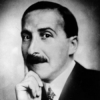Stefan Zweig

Stefan Zweig
Stefan Zweigwas an Austrian novelist, playwright, journalist and biographer. At the height of his literary career, in the 1920s and 1930s, he was one of the most popular writers in the world...
NationalityAustrian
ProfessionWriter
Date of Birth28 November 1881
CountryAustria
Stefan Zweig quotes about
play listening passionate
For one who is having no personal experience, the passionate disquiet of others is at any rate a titillation of the nerves, like seeing a play or listening to music.
book fate order
One only makes books in order to keep in touch with one's fellows after one has ceased to breath, and thus to defend oneself against the inexorable fate of all that lives - transitoriness and oblivion.
rumor lasts subjects
The subject of a rumor is always the last to hear it.
fall grace neighbor
A human being will accept the strictest disciplinary measures with a better grace if he knows that they will fall with equal severity on his neighbor.
breathing erotic veins
He was, like everyone of a strongly erotic disposition, twice as good, twice as much himself when he knew that women liked him, just as many actors find their most ardent vein when they sense that they have cast their spell over the audience, the breathing mass of spectators before them.
horse eye epidemics
All the pale horses of the apocalypse have stormed through my life, revolution, starvation, devaluation of currency and terror, epidemics, emigration; I have seen the great ideologies of the masses grow and spread out before my eyes. Fascism in Italy, National Socialism in Germany, Bolshevism in Russia, and, above all, that archpestilence, nationalism, which poisoned our flourishing European culture.
dresses problem
The dressmaker doesn't have problems unless the dress has to hide rather than reveal.
men thinking ideas
Besides, isn't it confoundedly easy to think you're a great man if you aren't burdened with the slightest idea that Rembrandt, Beethoven, Dante or Napoleon ever lived?
opposites perfect unions
The union of opposites, in so far as they are really complementary, always results in the most perfect harmony; and the seemingly incongruous is often the most natural.
destiny names skins
Names have a mysterious transforming power. Like a ring on a finger, a name may at first seem merely accidental, committing you to nothing; but before you realize its magical power, it's gotten under your skin, become part of you and your destiny.
self mind deception
The instinct for self-deception in human beings makes them try to banish from their minds dangers of which at bottom they are perfectly aware by declaring them non-existent.
mirrors musical everyday
What is noble, lyrical, tender in the upper level shown is also with the servants, scoundrels, and scamps, as in a distorting mirror. This contrast seems to me a most appealing musical theme--to show love in its noble and crude forms, romanticism and crass realism mixed as in everyday life.
children mean sleep
Being sent to bed is a terrible command to all children, because it means the most public possible humiliation in front of adults, the confession that they bear the stigma of childhood, of being small and having a child's need for sleep.
self-esteem character men
There is nothing that so raises a young man's self-esteem, that so contributes to the formation of his character as for him to find himself unexpectedly confronted with a task which he has to accomplish entirely on his own initiative and by his own efforts.